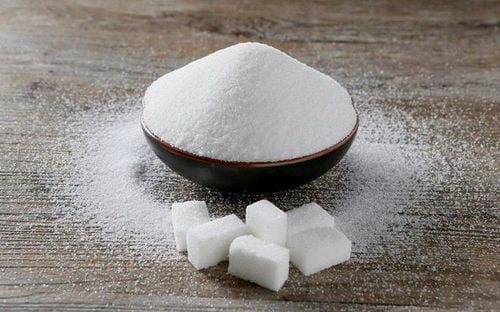This is an automatically translated article.
Excessive consumption of sugary drinks is harmful to your health, especially drinks such as sugary sodas, juices, highly sweetened coffees and other sources of liquid sugar.1. Sugary drinks are strongly linked to weight gain
Sucrose or table sugar provides large amounts of the simple sugar fructose. Fructose doesn't decrease the hunger hormone ghrelin or promote satiety like glucose, the type of sugar that forms when you digest starchy foods. Therefore, when you consume liquid sugar, you often add it on top of your total calories, because sugary drinks don't make you feel full.In one study, people who drank sugary soft drinks along with their current diet consumed 17% more calories than they did in the past.
Harms of sugary soft drinks from studies show that people who drink sugary drinks regularly gain more weight than those who don't.
In a study in children, drink a glass of soft drink daily days was associated with a 60% increased risk of obesity.
In fact, sugary drinks are one of the most obesity-inducing aspects of the modern diet.
2. A large amount of sugar is turned into fat in the liver
Table sugar (sucrose) and high-fructose corn syrup consist of 2 molecules - glucose and fructose in roughly equal amounts.Glucose can be metabolized by every cell in the body, while fructose can only be metabolized by the liver.
Sugary drinks are the easiest and most common way to consume too much fructose. When you consume too much, your liver becomes overloaded and turns the fructose into fat.
Some fats are transported as triglycerides in the blood and part of it remains in your liver. Over time, this can contribute to nonalcoholic fatty liver disease.

Đường ăn (sucrose) và xi-rô ngô có hàm lượng fructose cao bao gồm 2 phân tử - glucose và fructose với lượng gần bằng nhau
3. Sugar increases the accumulation of fat in the belly
Eating a lot of sugar has been linked to weight gain. In particular, fructose has been linked to a significant increase in dangerous fat around the belly and organs of the body - visceral fat or belly fat.Excess belly fat is associated with an increased risk of type 2 diabetes and heart disease. In a 10-week study, 32 healthy people consumed beverages sweetened with fructose or glucose. Those who consumed glucose had an increase in skin fat - not related to metabolic disease - while those who consumed fructose saw a significant increase in their belly fat.
4. Sugary soda can cause insulin resistance
The hormone insulin controls glucose from the blood into the body's cells. When you drink sugary soda, your cells can become less sensitive or resistant to the effects of insulin.When this happens, your pancreas has to make more insulin to remove glucose from the blood stream. As a result, the insulin level in the blood will spike. This condition is called insulin resistance.
Insulin resistance is believed to be a major cause of metabolic syndrome - a stepping stone to type 2 diabetes and heart disease.
5. Sugary drinks are the leading cause of type 2 diabetes
Type 2 diabetes is characterized by elevated blood sugar levels due to insulin resistance or deficiency. Since too much fructose can lead to insulin resistance, it's not surprising that many studies link soda consumption with type 2 diabetes.In fact, drinking at least one can of soft drink has Continuous sugar per day is associated with an increased risk of type 2 diabetes.
A recent study, looking at sugar consumption and diabetes in 175 countries, found that for every 150kcal of sugar per day The risk of type 2 diabetes increased by 1.1%.
6. Sugary soda contains no essential nutrients, only sugar
Sugar-sweetened soda contains virtually no essential nutrients, no vitamins, no minerals, and no fiber. Soda adds nothing to your diet except excessive added sugar and unnecessary calories.
Soda có đường hầu như không chứa các chất dinh dưỡng thiết yếu
7. Sugar Can Cause Leptin Resistance
Leptin, the hormone produced by your body's fat cells. It regulates the number of calories you eat and burn. Leptin levels change in response to both hunger and obesity, so it is often referred to as the satiety or hunger hormone.Resistance to the effects of this hormone - leptin resistance - is now thought to be one of the leading causes of fat gain in humans.
8. Sugary soft drinks can be addictive
Sugary soft drinks act like drugs. When you drink a lot of sugar, it can cause the brain to release dopamine, which gives a feeling of euphoria. Eating a lot of sugar may have a similar effect in some people, as your brain works hard to seek out dopamine-releasing activities.In fact, many studies show that sugar and processed junk food in general affect your brain just like drugs. For people with a predisposition to addiction, sugar can induce a reward-seeking behavior known as food addiction.
9. Increased risk of heart disease
Sugar intake has long been linked to heart disease risk, and it's well established that sugary drinks increase risk factors for heart disease, including high blood sugar, blood triglycerides, and high blood sugar. and small, dense LDL particles.Recent human studies document a strong association between sugar intake and heart disease risk in all populations

Lượng đường từ lâu có liên quan đến nguy cơ mắc bệnh tim
10. Increased risk of getting cancer
Cancer tends to go hand in hand with other chronic diseases such as obesity, type 2 diabetes and heart disease. For this reason, it is not surprising to find that sugary drinks are often associated with an increased risk of cancer.A study of 60,000 adults found that those who drank 2 or more sugary soft drinks per week had an 87% higher risk of pancreatic cancer than those who did not drink water. sweet.
Postmenopausal women who drink a lot of sugary soft drinks may also have an increased risk of endometrial cancer or cancer of the inner lining of the uterus.
Furthermore, sugary beverage intake is associated with cancer recurrence and mortality in colorectal cancer patients.
11. Sugar and acid in soda are harmful to oral health
Sugary sodas, especially sodas, are not good for your teeth. Because the composition of this drink contains acids such as phosphoric acid and carbonic acid. These acids create a highly acidic environment in your mouth, leaving your teeth vulnerable to decay.Although the acids in soda themselves can cause damage, the combination with sugar makes soda especially harmful. Sugar provides easily digestible energy for harmful bacteria in the mouth, which, combined with acids, wreaks havoc on oral health over time.

Soda có đường đặc biệt là lượng đường nước ngọt có ga không tốt cho răng của bạn
12. The risk of gout increases dramatically
Gout is characterized by inflammation and pain in the joints, especially the big toes. Gout usually occurs when high levels of uric acid in the blood crystallize. Fructose belongs to the main group of carbohydrates known to increase uric acid levels. As a result, many large observational studies have identified a strong link between sugary drinks and gout. What's more, long-term studies show that sugary sodas increase the risk of gout by 75% in women and increase the risk by nearly 50% in men.13. Increased risk of dementia
Dementia is a decline in brain function in older adults. The most common form of Alzheimer's disease.Research shows that any increase in blood sugar is strongly associated with an increased risk of dementia. In other words, the higher your blood sugar, the higher your risk of developing dementia. Since sugary drinks lead to a rapid spike in blood sugar, that means they could increase your risk of dementia.
Drinking a lot of sugary drinks can have many adverse effects on your health, ranging from an increased risk of tooth decay to a higher risk of heart disease and metabolic disorders like type 2 diabetes. Sugary soda intake is also a consistent risk factor for weight gain and obesity.
Please dial HOTLINE for more information or register for an appointment HERE. Download MyVinmec app to make appointments faster and to manage your bookings easily.
Reference source: healthline.com












